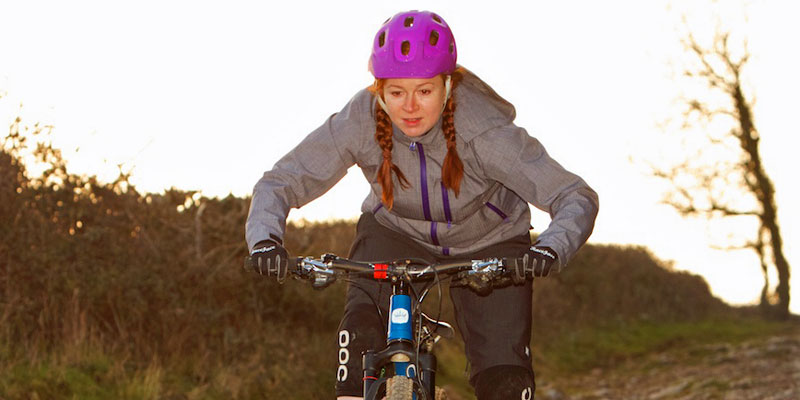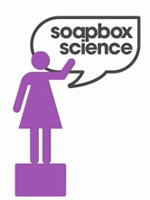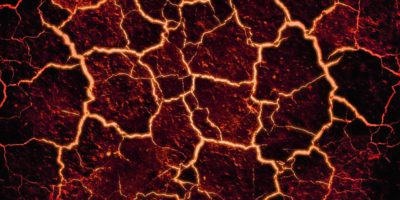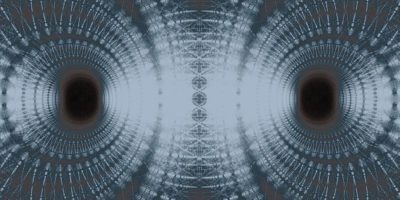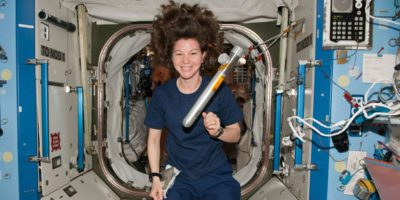Aoife Glass was Media & Events Coordinator for Soapbox Science in 2015. She worked alongside the established team to organise, promote and evaluate events across the UK. Aoife had previously worked at the Natural History Museum in London and has also developed content for a blockbuster museum exhibition in Abu Dhabi in the United Arab Emirates. She is a keen cyclist and she was Deputy Editor of Total Women’s Cycling, and now works on BikeRadar.
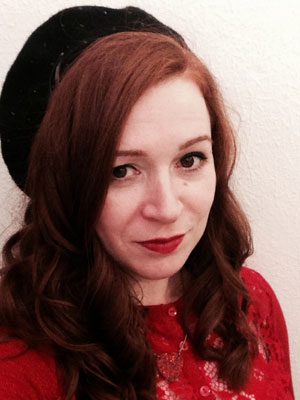
Watching Open University programmes and telling my parents all about this thing called plate tectonics
For as long as I can remember, I’ve been interested in science. In particular, volcanoes and earthquakes. Apparently, when I was little I used to watch Open University programmes in the morning, and I remember telling my parents all about this thing called plate tectonics. So it was kind of inevitable I’d visit the Natural History Museum in London at some point, and I fell in love with it as soon as I did.
I used to go all the time, roaming the galleries with a canvas bag with ‘supplies’ in, hoping one day I’d get to go through one of the magical doors and see what went on behind them. I loved science and English at school, and wanted to do them all at A-Level, but I was told that there was nothing I could do as a career that combined them both. How wrong was that advice, as it turned out?!
The best weekend job in the world; working front of house at the Natural History Museum
I studied Geological Sciences at Imperial College, London, and got the best weekend job in the world; working front of house at the Natural History Museum (NHM) which was just next-door. I finally not only got to go behind those magical doors, I had my own key! And I loved the chance to share my passion for the scientific research done there with visitors.
Torn between natural hazards and communication
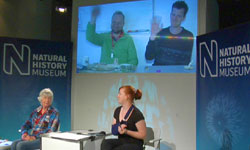
Nature Live was a daily events programme, which took place in a studio with a live audience of the general public, and was also often webcast live. I programmed, developed and presented events with hundreds of scientists on thousands of topics, from the natural history of chocolate to forensic science.
Dinosnores and Crime Scene Live

I worked for a year as a freelance science communicator on a number of projects, including developing content and sourcing objects for a blockbuster family exhibition in Abu Dhabi. I even worked a winter ski season as a seasonaire.
Increasingly interested in cycling
Then my career took a sideways shift. I’d gotten increasingly interested in cycling, and an opportunity came up at a new website called Total Women’s Cycling. I came on board as Deputy Editor when it was relatively new and working closely with the editor, helped grow it to the largest women’s specific cycling site in Europe, and helped organise and run the first women’s specific cycling awards.
Since leaving Total Women’s Cycling last autumn to move South West, I’ve been working as a freelance sports journalist, web content editor and science communicator. I’ve started co-presenting on a local radio science show which is brilliant fun, and of course I’ve been working on Soapbox Science!
The perfect combination of areas I was passionate about; gender equality, science and innovative, exciting science communication. Irresistible!
Although I love cycling, I missed science, and I also saw increasing parallels between the obstacles faced by women in sport and women in science. I’d already moved to the South West when I spotted the opportunity at Soapbox Science, and it seemed the perfect combination of areas I was passionate about; gender equality, science, and innovative, exciting science communication. It was irresistible!
I provide logistical support for Seirian [Sumner] and Nathalie [Pettorelli], helping out with the many tasks required to make a programme of this size run smoothly. This year, we’ve expanded the training program and I’ve just help develop and deliver training events in London, Harwell, Bristol, Glasgow and Belfast to ensure our speakers feel informed, prepared and excited about taking part in Soapbox Science.
Ensuring Soapbox Science 2015 goes amazingly well
My objectives in my current role are to ensure that the 2015 Soapbox Science festival of events goes amazingly well! So this means making sure we have a full complement of speakers (check!), a team of volunteers for each location (check!), local organisers and a location for each event (check!) and that our speakers all feel as prepared and confident as possible.
On the back of this, it’s important that we get good evaluation data, as that will help us get funding to run events in future years, and hopefully also expand the programme. Soapbox Science Paris, New York and Sydney for 2016 anyone?!
Expanding exponentially – logistical challenges of so many events in so many different locations
In the first four years of Soapbox Science, 87 women took part as speakers in total. This year alone sees 90 women taking to their soapbox. The festival is expanding exponentially, and that means many more locations to coordinate. Luckily, each location has its own organiser who’s familiar with and responsible for the location, the individual speakers and volunteers, and so on. We provide support overall for the national programme, lead on the recruitment and selection drive for speakers, and the national press side of things.
Actually very low tech: Just add some soapboxes, a location and some brilliant female scientists
But one of the brilliant things about Soapbox Science is that it’s actually very low tech. Essentially, you just need some soapboxes, a location, and some brilliant female scientists. You don’t need to find expensive venues, or electricity supplies. This means on the day itself, the logistics are fairly simple.
Sharing science and having an amazing time doing it
Ensuring all our speakers feel as confident and comfortable as possible standing up on those Soapboxes and speaking with the general public is critical to the success of Soapbox Science. We know they have incredible science to share, so we want to do all we can to make sure they have an amazing time doing it.
The training sessions we run cover things like presentations skills, what language to use, and how to structure a talk where your audience may be coming and going throughout. I also talk about ways of engaging the audience, like asking them questions, involving them in demonstrations, using props and so on.
Big name speakers sharing their expertise
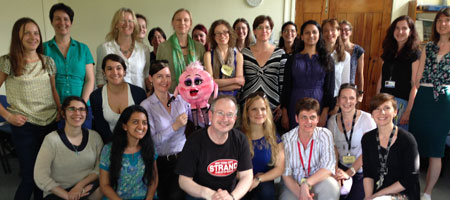
We’re also very lucky to have the support of some big names who come along and deliver sessions on our training days. We’ve had George McGavin, Vivienne Parry and Robin Ince share their expertise in the 2015.
Our brilliant volunteers are each allocated roles when they sign up; some will work with a particular speaker, so they are introduced before the event and can email or meet up to talk about what they’ll be doing. Others will be conducting evaluation and are sent briefing notes in advance. On the day itself, everyone meets before hand for a briefing where we’ll talk through the roles, answer any questions, and make sure everyone is comfortable with what they’re doing. Then off we go!
Project funding
This year, the Science and Technology Facilities Council have come on board as a major supporter. They’ve provided funds to support a number of scientists get to events and develop props, to cover the Media & Event Coordinator role, which is a new job in Soapbox Science, and various other things like our branded lab coats and t-shirts for scientists and speakers.
We’ve also got funding from the National Environmental Research Council as part of their Summer of Science 50th anniversary celebrations. We’ve very happy to be involved in that! L’Oréal is supporting our London event, and lots of our speakers have individual sponsorship from different learned bodies who provide pots of money for things like travel and prop development.
Measuring the impact / feedback
This year we’re researching two areas, to match the two objectives of Soapbox Science. So we have an evaluation team at each event who’ll be looking at things like how long people in the audience stay for, whether they ask questions and get involved, whether they enjoyed it and what they remember from the talks they’ve heard.
This year we’re researching two areas, to match the two objectives of Soapbox Science. So we have an evaluation team at each event who’ll be looking at things like how long people in the audience stay for, whether they ask questions and get involved, whether they enjoyed it and what they remember from the talks they’ve heard.
The second area is the impact that Soapbox Science has on the speakers themselves. We hope that taking part in the festival provides a positive experience, increased confidence, personal and professional development and the opportunity to increase their profiles. Through the evaluation program, which is being expertly coordinated by Cassandra Murray at ZSL [Zoological Society of London], we’ll gather data on both of these areas. This will help us improve the program, garner more support and get more funding.
Looking forward to seeing the Soapbox Scientists sharing their passion, engaging and inspiring people
Having heard snippets of some of the talks that are being prepared in the training sessions, I am looking forward to seeing our speakers in action! I can’t wait to see it all come together, to see our Soapbox Scientists up on their boxes, sharing their passion, engaging people with their research, and inspiring people.
In no more than three words, what to expect from Soapbox Science in 2015:
Mind expanding fun!
https://twitter.com/silverstrange
https://twitter.com/soapboxscience
https://www.facebook.com/soapboxscience

